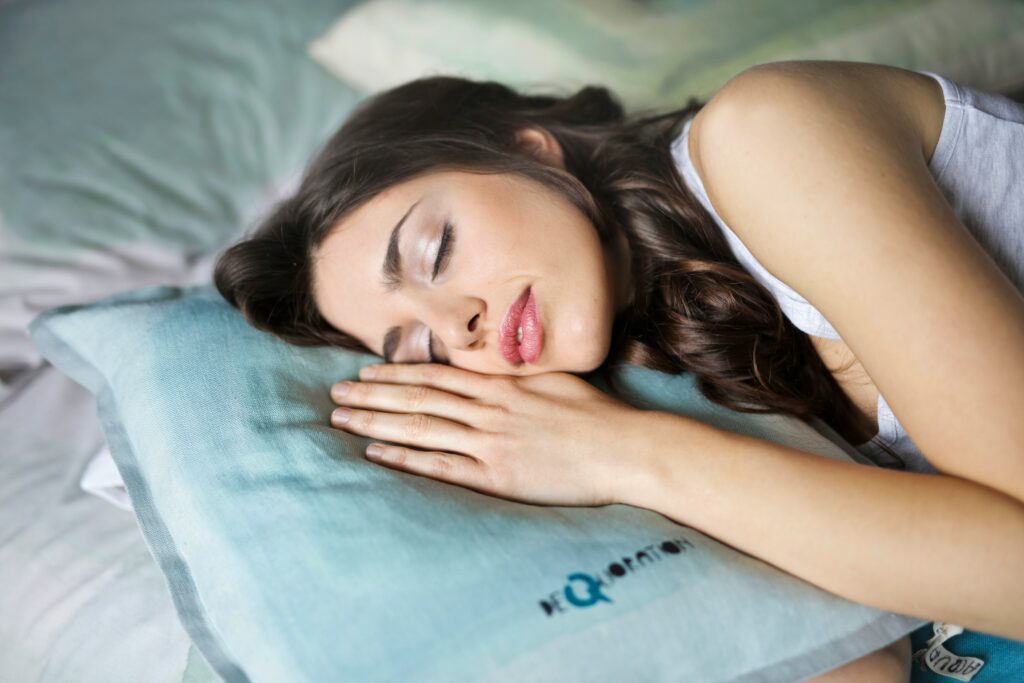Optimize Your Sleep Environment
Creating the right sleep environment is one of the simplest yet most powerful ways to improve your rest. The quality of your bedroom setup directly impacts how quickly you fall asleep, how deeply you sleep, and how refreshed you feel the next day.
Set the Ideal Sleep Conditions
Sleep specialists agree that your bedroom should promote stillness and comfort. Focus on these core elements:
- Darkness: Eliminate artificial light. This means no glowing clocks or screens, and preferably total blackout curtains.
- Cool Temperature: Aim for around 60 to 67 degrees Fahrenheit. A cooler room helps signal the body that it’s time to sleep.
- Quiet: Reduce disruptive noises. If total silence feels uncomfortable, use a sound machine to create gentle background noise.
Choose the Right Mattress and Pillow
Your mattress and pillow matter more than you might think. They form the backbone of your physical comfort during the night and can make or break the quality of your sleep.
Most sleep specialists recommend:
- A medium-firm mattress that supports spinal alignment while relieving pressure points
- A pillow that keeps your neck in a neutral position, depending on whether you sleep on your back, side, or stomach
If you wake up with aches and stiffness, it might be time to reassess your current setup.
Use Smart Sleep Aids to Your Advantage
Technology and small tools can become allies when used intentionally.
- Blue light blockers: Reduce exposure to screens at least an hour before bed, or use blue light-filtering glasses if screen time is unavoidable.
- Blackout curtains: These help block streetlights and early morning sun, keeping your internal clock running on your preferred schedule.
- White noise machines: Constant background sounds can drown out disruptive noise like traffic or a snoring partner.
A few thoughtful changes to your sleep space can dramatically improve sleep quality—without major renovations or expensive tools.
Sleep hygiene sounds like something sterile and medical, but it’s really just about the habits and environment that shape how well you sleep. Think of it as the behind-the-scenes system that decides whether your body shuts down properly at night or stays wired and restless.
Poor sleep hygiene shows up in ways you might not immediately link to rest. Foggy thinking. Short fuse. Getting sick more often. Over time, bad sleep habits can also mess with metabolic health, spike anxiety, and even chip away at cognitive function.
What starts as a few late nights or screen binges before bed can quietly build into years of poor sleep. All those small choices—like skipping wind-down routines, sleeping in on weekends, or working in bed—stack up. Before you know it, your sleep schedule is erratic, your focus is toast, and you’re dragging through the day. The good news? Small, consistent shifts in sleep hygiene can reset the system and bring real results.
Getting better sleep isn’t about buying fancier pillows or tracking REM cycles on your watch. It starts with getting boring: same bedtime, same wake-up time, every single day. Your body needs rhythm, not chaos. Sleeping in or pulling late nights on the weekend just throws off your internal clock and makes Mondays miserable.
Next up: light. It’s not just about flipping a switch. You want natural sunlight early in the day—ideally within an hour of waking up. It helps lock in your body’s daytime mode. At night, do the opposite. Drop the brightness. Avoid ceiling lights. Lamps and warm tones signal that it’s time to wind down.
And speaking of winding down, set rituals matter. Maybe it’s making tea, turning off screens, reading a few pages of an actual book. The trick is to send your brain the same signals at the same time, every evening. Predictable beats perfect. It’s not about finding the ultimate sleep hack—it’s about building a routine your body can trust.
Caffeine can be a kickstart or a killer, depending on when you use it. Early in the day, it sharpens your focus and removes the morning fog. Too late, and you’re staring at the ceiling at 2 a.m. A good cutoff time? About six hours before bed. Same goes for alcohol. A drink might knock you out quickly, but it wrecks your REM cycle. Even a small amount too close to bedtime drags down sleep quality.
Movement helps, but timing matters. A morning workout can snap you into gear and reset your body clock. Intense evening sessions, though, flood your system with adrenaline and mess with wind-down time. Light stretching or walking after dinner? Fine. A full CrossFit routine at 9 p.m.? Maybe not.
As for naps, tread carefully. A 20-minute power nap in the early afternoon can recharge your system. Push that into late afternoon or fall into a deep sleep cycle, and you could tank your nighttime rest. Think of naps as a short-term patch, not a replacement for solid sleep.
The key across the board is intentional timing. Managing energy isn’t just about what you do — it’s when you do it.
Before You Reach for Sleep Meds: What Experts Recommend
Lifestyle First, Medication Last
When sleep becomes a nightly struggle, it’s tempting to reach for over-the-counter options or prescription aids. But sleep specialists almost universally advise starting with behavioral and environmental changes before considering medication.
Experts suggest trying the following first:
- Maintain a consistent sleep and wake schedule, even on weekends
- Limit screen time at least one hour before bed
- Avoid caffeine and heavy meals in the evening
- Reserve the bed for sleep only—not work, watching TV, or scrolling
- Create a relaxing bedtime routine (e.g. warm shower, light reading, soft lighting)
These simple but powerful strategies often lead to measurable improvements in sleep without the potential side effects or dependency risks associated with sleep aids.
When It’s More Than Just a Bad Night
Poor sleep isn’t always a standalone issue. If restless nights persist despite lifestyle changes, it may be time to dig deeper. Some signs can signal an underlying condition that requires medical attention.
Look out for:
- Loud, chronic snoring or gasping sounds (may indicate sleep apnea)
- Constant fatigue or daytime sleepiness, even after a full night’s sleep
- Difficulty falling or staying asleep for weeks at a time
- Restless legs or uncomfortable nighttime sensations that disrupt rest
- Mood swings, anxiety, or depression linked to changes in sleep quality
These symptoms can point to actual sleep disorders like insomnia, circadian rhythm disorders, or parasomnias that may need professional diagnosis and targeted treatment.
The Hidden Impact of Stress and Inflammation
Stress and low-grade inflammation are lesser-known but major contributors to sleeplessness. Chronic stress keeps cortisol levels elevated, disrupting the natural sleep-wake cycle. Similarly, inflammation in the body can contribute to pain, mental fog, and physical discomfort—each of which makes quality rest harder to achieve.
To break the cycle:
- Incorporate stress-reduction practices such as meditation, breathing exercises, or journaling
- Eat anti-inflammatory foods like leafy greens, berries, fatty fish, and turmeric
- Speak with a healthcare provider about chronic inflammation and stress as part of your sleep profile
Learn more about how inflammation affects your health in this related article: What Doctors Want You To Know About Chronic Inflammation
The 60-minute no-screen rule before bed
Let’s be honest. That last scroll before sleep isn’t helping anyone. The 60-minute no-screen rule is gaining traction again, not as a wellness trend, but as a survival tactic. Blue light isn’t just bad press — it actually messes with circadian rhythms. Sleep gets lighter. Mornings get slower. Focus slips.
Creators who rely on energy and clarity to film, edit, and engage just don’t have the luxury of poor sleep hygiene anymore. More vloggers are building no-screen wind-down routines: reading paper books, low-light journaling, or doing absolutely nothing. It’s about quieting your system before a day of high-output grind.
The phone-free bedroom debate is also bubbling up again. Some call it overblown. But cutting the cord between bed and device helps set cognitive boundaries. It trains the brain to stop looping through clickbait when it should be resting. For a lot of creators, it’s not hype — it’s maintenance.
Bottom line: turn the tech down so your mind can show up sharper in front of the lens tomorrow.
A solid night’s sleep doesn’t start at bedtime. It starts with routine. Waking and sleeping at the same time every day, even on weekends, helps lock in your body’s natural rhythm. It’s nothing fancy—just consistency.
Light also matters. Get sunlight in the morning if you can. In the evening, start winding things down. Avoid bright, artificial light late at night. It throws off your internal clock, telling your brain it’s go-time when it’s not.
What you eat and drink plays a role too. Skip heavy meals and alcohol close to lights out. The body wants to rest, not digest or detox. And screens? Cut them off at least an hour before bed. No blue light. No doomscrolling. Let your mind cool down.
Finally, set yourself up with a clean sleep space. Quiet, dark, cool. No clutter. No buzzing phones. Just a place where your brain gets the message: it’s time to rest.
Sleep isn’t optional. It’s not a reward and it’s definitely not a luxury. It is core maintenance for your brain and body. No matter how optimized your camera setup is or how much coffee powers your edits, the truth is this: if you’re not sleeping enough, everything suffers—creativity, energy, patience, and eventually your health.
But here’s the good news—you don’t need some perfect wind-down playlist or a strict tech-free Zen routine. What you need is consistency. Going to bed and waking up at the same time every day matters more than what you do in those final moments before you knock out. Predictability is what your body and brain thrive on.
Start small. Shift your bedtime 15 minutes earlier. Cut screens 30 minutes before bed. Drink water instead of that second late coffee. Keep doing it. These aren’t magic tricks, but stacked over time, they change how you feel, work, and show up on camera. Small habits win the long game. So sleep like it matters—because it really does.



